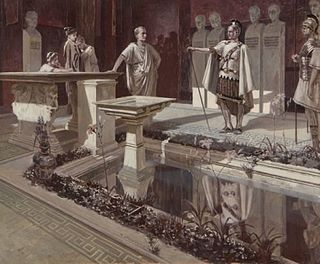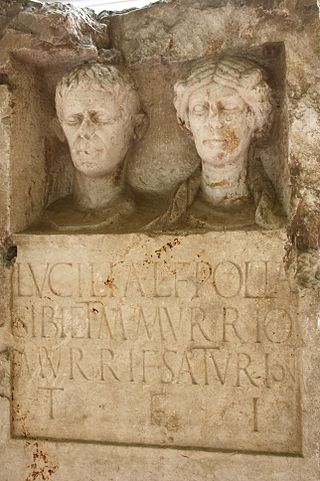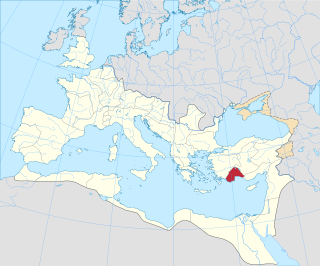
AD 79 (LXXIX) was a common year starting on Friday of the Julian calendar. At the time, it was known as the Year of the Consulship of Titus and Vespasianus. The denomination AD 79 for this year has been used since the early medieval period, when the Anno Domini calendar era became the prevalent method in Europe for naming years.

The 70s was a decade that ran from January 1, AD 70, to December 31, AD 79.

Gaius Suetonius Tranquillus, commonly referred to as Suetonius, was a Roman historian who wrote during the early Imperial era of the Roman Empire. His most important surviving work is a set of biographies of 12 successive Roman rulers from Julius Caesar to Domitian, properly titled De vita Caesarum. Other works by Suetonius concerned the daily life of Rome, politics, oratory, and the lives of famous writers, including poets, historians, and grammarians. A few of these books have partially survived, but many have been lost.

Herod Agrippa II, officially named Marcus Julius Agrippa and sometimes shortened to Agrippa, was the last ruler from the Herodian dynasty, reigning over territories outside of Judea as a Roman client. Agrippa II fled Jerusalem in 66, fearing the Jewish uprising and supported the Roman side in the First Jewish–Roman War.
Antonia Caenis, a former slave and secretary of Antonia Minor, was Roman emperor Vespasian's contubernalis.

Aulus Plautius was a Roman politician and general of the mid-1st century. He began the Roman conquest of Britain in 43, and became the first governor of the new province, serving from 43 to 46.

The gens Lucilia was a plebeian family at ancient Rome. The most famous member of this gens was the poet Gaius Lucilius, who flourished during the latter part of the second century BC. Although many Lucilii appear in Roman history, the only one known to have obtained any of the higher offices of the Roman state was Lucilius Longus, consul suffectus in AD 7.
Tiberius Claudius Balbillus Modestus, more commonly known as Tiberius Claudius Balbilus, was a distinguished Ancient Roman scholar, politician and a court astrologer to the Roman emperors Claudius, Nero, and Vespasian.

Saint Apollinaris Claudius, otherwise Apollinaris of Hierapolis or Apollinaris the Apologist, was a Christian leader and writer of the 2nd century.

Annia Aurelia Faustina was an Anatolian Roman noblewoman. She was briefly married to the Roman emperor Elagabalus in 221 and thus a Roman empress. She was Elagabalus' third wife.

Apollinaris of Ravenna is a Syrian saint, whom the Roman Martyrology describes as "a bishop who, according to tradition, while spreading among the nations the unsearchable riches of Christ, led his flock as a good shepherd and honoured the Church of Classis near Ravenna by a glorious martyrdom."

Apollinaris is a naturally sparkling mineral water from a spring in Bad Neuenahr, Germany. Discovered in 1852, it was popularised in England and on the Continent and became the leading table-water of its time until about World War II. There are many references to it in high and popular culture. Today the brand is owned by Coca-Cola.

The Praetorian Prefecture of Gaul was one of four large prefectures into which the Late Roman Empire was divided.

Tiberius Plautius Silvanus Aelianus was a Roman patrician who twice served as consul, in 45 and 74 AD. He was the natural son of Lucius Aelius Lamia and the adopted son of Marcus Plautius Silvanus, brother of Plautia Urgulanilla, first wife of the emperor Claudius. It is known he offered up the prayer as pontifex when the first stone of the new Capitol was laid in 70 AD. In some ancient sources he is referred to as Plautius Aelianus, but we learn from an inscription that his full name was Tiberius Plautius Silvanus Aelianus, and that he held many important military commands.

Lycia and Pamphylia was the name of a province of the Roman empire, located in southern Anatolia. It was created by the emperor Vespasian, who merged Lycia and Pamphylia into a single administrative unit. In 43 AD, the emperor Claudius had annexed Lycia. Pamphylia had been a part of the province of Galatia.
Pompeius Silvanus, fully Marcus Pompeius Silvanus Staberius Flavinus or Flavianus, was a Roman senator who was consul twice.

Quintus Julius Cordinus Gaius Rutilius Gallicus was a Roman senator who held several posts in the emperor's service. He was twice suffect consul: for the first time in the nundinium of September to October 70 AD; and the second time in 85 with Lucius Valerius Catullus Messalinus as his colleague, succeeding the Emperor Domitian.
Lucius Annius Bassus was a Roman senator of the early Roman Empire, whose known career flourished under the reign of Vespasian. He was suffect consul in the nundinium of November to December AD 70 as the colleague of Gaius Laecanius Bassus Caecina Paetus.

This article lists historical events that occurred between 1–100 in modern-day Lebanon or regarding its people.
![]() This article incorporates text from a publication now in the public domain : Smith, William (1870). "Apollinaris, Claudius". In Smith, William (ed.). Dictionary of Greek and Roman Biography and Mythology . Vol. 1. p. 230.
This article incorporates text from a publication now in the public domain : Smith, William (1870). "Apollinaris, Claudius". In Smith, William (ed.). Dictionary of Greek and Roman Biography and Mythology . Vol. 1. p. 230.













